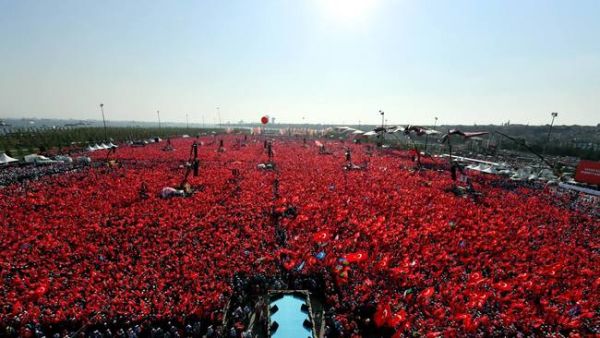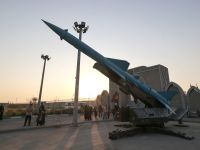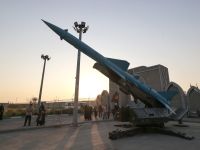Turkish President Recep Tayyip Erdogan renewed calls for the reintroduction of the death penalty at a massive rally of hundreds of thousands of people in Istanbul on Sunday to protest last month's failed coup attempt by elements of the Turkish military.
"If they [the people] reach such a decision, then I believe the political parties will comply with this decision," Erdogan said at the rally in the district of Yenikapi on the Sea of Marmara coast on the European side of the city.
"I say in advance: I would ratify such a decision from parliament," the president said.
Erdogan's calls for the reintroduction of the death penalty have placed him on a collision course with the European Union, which Turkey has been trying to join for decades. EU officials said the death penalty would exclude Turkey from joining the bloc.
Despite these tensions, German Vice Chancellor Sigmar Gabriel said on Sunday the bloc should not shut Turkey out.
"In the situation we are currently in, we have to try every channel to negotiate with Turkey," he said in an interview with Germany's state-run ARD channel.
He said it made "no sense to pretend we don't have to get on with this difficult neighbour." Gabriel added that he did not think Turkey was likely to become a full EU member in the next decade or two.
State-run news agency Anadolu said 5 million took part in the rally, but people attending estimated it was closer to 1 million.
Hosted by Erdogan, Sunday's "Democracy and Martyrs' Rally" is thought to be the largest demonstration since the July 15 attempted coup, which was averted in no small part by citizens who took to the streets to block rogue soldiers.
It was attended by the ruling conservative Justice and Development Party (AKP), along with two opposition parties - the right-wing Nationalist Movement Party (MHP), represented by its chief Devlet Bahceli, and centre-left Republican People's Party (CHP), represented by its head and leader of the opposition, Kemal Kilicdaroglu.
The pro-Kurdish Peoples' Democratic Party (HDP), the third largest party in parliament, was not invited, as Erdogan accuses it of ties to the banned Kurdistan Workers' Party (PKK).
Erdogan again criticized German authorities for not allowing him to speak by video link to supporters at a recent Cologne rally.
"Where is the democracy?" Erdogan asked, alleging that a similar PKK video had previously been allowed. He suggested that if Germany chose to support "terrorists" it would come back at them "like a boomerang."
From the outset all parties in parliament opposed the coup, which left at least 260 people dead and prompted the government to announce a state of emergency. Erdogan blames his former ally turned arch enemy Fethullah Gulen for organizing the coup.
All three opposition parties also voiced concern that they were not consulted about structural reforms for the armed forces, including bringing them under more civilian control.
Some opposition members and rights groups like Amnesty International have also expressed worries about human rights violations and abuses of power in recent weeks.
The Turkish authorities said more than 60,000 government workers have been suspended or fired in the wake of the coup as it purges alleged supporters of Gulen. Some 20,000 teachers have also lost their licences.
More than 25,000 people have been detained, over 13,000 of whom have been formally arrested.
Gulen - a Turkish-born Islamic cleric living in self-imposed exile in the United States since 1999 who has a large global following that runs schools, businesses and charities - denies the charges.
Critics of Erdogan, many of whom warned about the Gulenist movement for years, say the ruling party helped place followers of the cleric into the state bureaucracy. They then used these position to carry out the coup, they say. Erdogan himself has admitted he was fooled by Gulen.
Turkish officials are demanding Gulen's extradition, but no official request has been filed to the United States. The matter is causing tensions in relations between Ankara and Washington.








